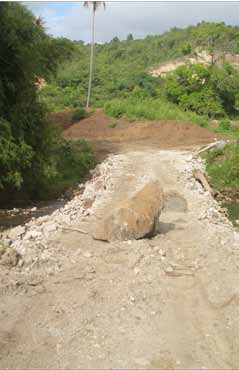
SFA 2003
OverviewThe effect of land degradation in Saint Lucia has been reflected in the progressive dwindling of the island’s water resources. The ecosystem is suffering due to agricultural and industrial expansion, coupled with the housing and hotel development which has become necessary because of migration trends and the increase in the country’s population. Under the provisions of the Special Framework of Assistance (SFA-2003), the European Commission granted EUR8.0 million (EC$28 million) to the Government of Saint Lucia to implement the programme ‘Economic and Agricultural Diversification, and Poverty Reduction through Integrated Resource Management’ (INRMP). The overall objective of the programme was to provide continued support to banana commercialization, agricultural and general economic diversification efforts.
Within the scope of the INRMP, an Environmental Management Fund (EMF) was established in support of rural communities, where assistance was needed for larger environmentrelated initiatives. A budget of EUR4.0 million (EC$14 million) was therefore allocated to the Banana Industry Trust with a three year grant contract to manage the EMF in January 2007. The purpose of the programme was to improve the management of Saint Lucia’s natural resources by building capacity and obtaining consensus on a collective vision for the efficient, sustainable and equitable use of the resources. The Programme consisted of activities at the national level, as well as several projects at the community level.

The BIT worked closely with the Ministry of Economic Affairs and Economic Planning, National Development and the Public Service under whose authority the SFA 2003 Programme had been placed. For access to the funds, detailed proposals from prospective beneficiaries complying with the EU Practical Guidelines were submitted to the BIT for review. Approved projects were put out to tender as funds were not given directly to the beneficiaries.The areas eligible for funding under the EMF were quite broad and included:

- Reforestation Programmes to Stabilize vulnerable areas
- Watershed improvement interventions derived from watershed management plans
- Alternative cropping
- Riverbank stabilization and interventions to reduce flood risk
- Operation of a land bank, including compensation mechanisms for lands acquired in trust
- Water supply systems for both potable water and hillside irrigation
- Systems for solid and liquid waste management in rural communities especially in upland areas
- Coastal zone interventions in near shore marine areas
- Eco/heritage Tourism interventions
- Technical innovations including inter alia, the exploitation of renewable energy sources, group water exploitation etc.
The Office of the National Authorizing Officer (NAO) of the Ministry of Finance, Economic Affairs and National Development provided the overall coordination, monitoring and general guidance of the SFA 2003 Programme.
